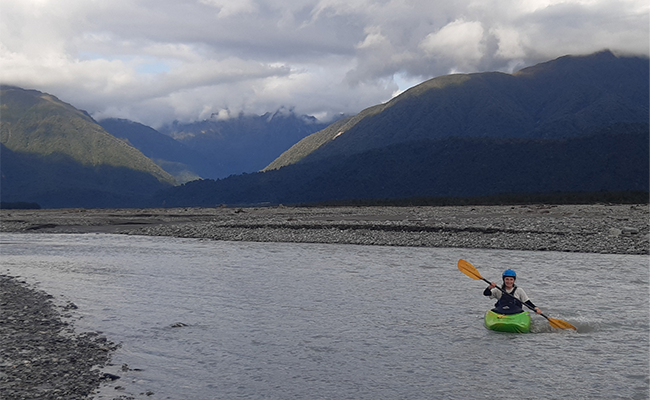
Master's candidate Ellorine Carle using her kayak to get across Fox River so she can survey a gravel bed. Photo: Pascal Sirguey
Satellite imaging is being used by an Otago Master's student to measure how much the terrain under Fox Glacier catchment has changed since the glacier started retreating.
Ellorine Carle, who is doing her masters through the School of Surveying, says the area is known as a para-glacial environment – an area where glacier retreat has recently taken place.
It's well documented that both the Fox Glacier and nearby Franz Josef Glacier are sensitive to temperature change and are both shrinking as a result of climate change, she says.
There are landslides occurring within the catchment area as direct result of Fox Glacier retreating, but there are also landslides taking place not within the immediate area of the shrinking glacier.
The landslides at the end of the glacier are happening because the ice had been holding the side of the mountain up, she says.
“Once the ice retreats, you're left with really steep walls which become unstable.”
There is another large landslide taking place within the catchment that is not related to the shrinking glacier, known as the Alpine Gardens landslide. It is one of the largest, active landslides in the country, and started in 2018.
“We're not really sure why it became activated.”
Carle says she is not looking at what is causing the landslides as such, but characterising how much has changed over time since they began, using these high-resolution elevation models.
From the late 1980s until 2008 there was a period of glacier growth, but since then the glacier has started retreating further than it has before.
“We're kind of into uncharted territory,” she says.
The area was once very popular with visitors and a “highly valued” destination, however the catchment area is now very unstable and dynamic which has caused a lot of damage to infrastructure.
As a result, the Department of Conservation has closed all the hiking tracks up the valley because it's no longer safe.
“They just keep getting washed away by the river and by landslides. Things are changing every year, or even more rapidly than that.”
The township is now having to start thinking about what is next for the valley with access to the glacier closed. Nearby Franz Josef is in a similar predicament, with the only way to access either glacier being by helicopter.
“So just kind of studying the area so that we can better understand the hazards that are posed by the area, as well as the processes going on through the melting of ice and how much sediment is being deposited in the valley.
“It's quite useful information for the tourism companies as well as general knowledge of what happens when glaciers recede really quickly.”
One of the reasons Carle is studying the catchment is because there is data available on the area. Her supervisor is working on an automated pipeline to map and monitor landscapes using satellite imagery which is captured in stereo – this means you can capture multiple images of a particular spot, all taken from different angles.
From those images, Carle and her supervisor are then using geometry triangulation to build a 3D model of the spot. The pair have also been testing a way of rapidly mapping an area using this type of imagery.
Carle says there was a hut in a national park which was hit by a landslide in 2022. Her supervisor was able to get the satellite imagery a couple of days after the landslide, and using a previously acquired elevation model, he was able to determine how much land mass had been lost.
“So, whether it's a big landslide, or ice melting or even things like trees being hacked down, you can see those changes in the landscape with different elevation models.”
Carle entered a video she had made outlining her research in the FAST! My Thesis in 5 min competition, and was surprised to learn she was one of four to win.
Once she graduates with her master's, she would like to work in an area related to climate.
“I'm pretty passionate about climate change solutions.
“I just want to solve problems and work with good people.”
-Kōrero by internal communications adviser, Koren Allpress